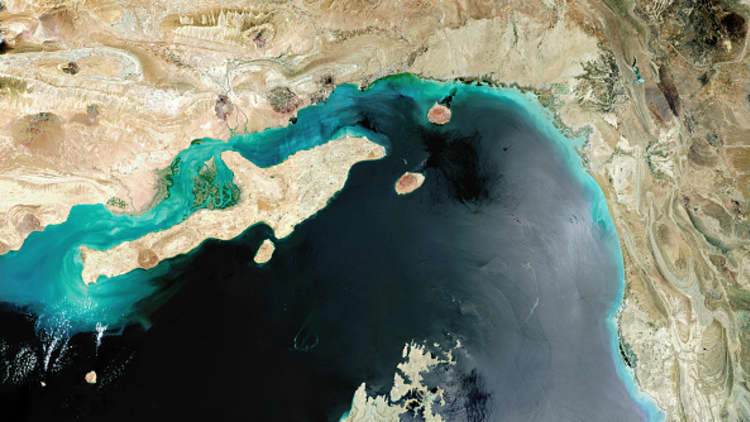
Iran’s foreign ministry reportedly said it would implement countermeasures against the U.S. if it tries to block its oil exports.
"If America wants to take a serious step in this direction it will definitely be met with a reaction and equal countermeasures from Iran," Foreign Ministry Spokesman Bahram Qassemi was quoted as saying on Tuesday morning by the state news agency IRNA, according to Reuters.
Qassemi didn’t detail what Iran could do but the comment comes as the U.S. presses its allies to stop importing oil from Iran ahead of sanctions that are due to be reinstated on the country in August and November. Iranian President Hassan Rouhani suggested Sunday that Iran could close the Straits of Hormuz, a channel that leads out of the Persian Gulf and through which much of the Middle East’s oil is shipped and exported.
The U.S. Energy Information Administration (EIA) identifies the Strait of Hormuz as one of seven major “maritime chokepoints” that are “critical to global energy security.”
By volume of oil transit, the strait is in fact the busiest chokepoint. In 2016, data from the EIA showed total flows through the channel reached a record high of 18.5 million barrels a day. China, Japan, India, South Korea, and Singapore are the largest destinations for oil moving through the strait, it added.
Thus, closing the channel would have dramatic consequences for Iran, oil-importing countries and the entire industry.
“Disruptions to these routes could affect oil prices and add thousands of miles of transit in alternative routes,” the EIA said in a report last year, warning about what would happen if these chokepoints were disrupted.
“International energy markets depend on reliable transport routes. Blocking a chokepoint, even temporarily, can lead to substantial increases in total energy costs and world energy prices. Chokepoints also leave oil tankers vulnerable to theft from pirates, terrorist attacks, political unrest in the form of wars or hostilities, and shipping accidents that can lead to disastrous oil spills.”
Only Saudi Arabia and the United Arab Emirates have pipelines that can ship crude oil outside of the Persian Gulf and have additional pipeline capacity to circumvent the Strait of Hormuz, the EIA added.
Sanctions coming
Sanctions on Iran are set to be re-instated after President Donald Trump said in May that he was pulling the U.S. out of the 2015 nuclear deal brokered by America, the U.K., France, Germany, China and Russia.
The nuclear deal had lifted economic restrictions on Iran, allowing its oil industry to bounce back. Iran is the third largest producer in the 15-member OPEC group. In June 2018, it produced 3.8 million barrels of oil a day, OPEC data shows.
Trump said the accord was “terrible” and that Iran was not abiding with its terms that aimed to restrict its ability to develop nuclear weapons.
With sanctions about to kick in again, the U.S. administration has been stepping up pressure on other countries to observe the restrictions to Iran’s auto, oil and financial sectors, among others. It has warned companies and individuals that don’t observe the sanctions that they could be subject to secondary sanctions.
Relations between Iran and the U.S. hit a new low on Monday when Trump warned Iran in a tweet to not threaten the U.S., or else.
That was in response to Iran’s president saying Sunday that “America must understand well that peace with Iran is the mother of all peace, and war with Iran is the mother of all wars.”
Iran appeared to brush off Trump’s fury on Monday, with Foreign Minister Javad Zarif also taking to Twitter, echoing Trump’s warning to “Be cautious.”


